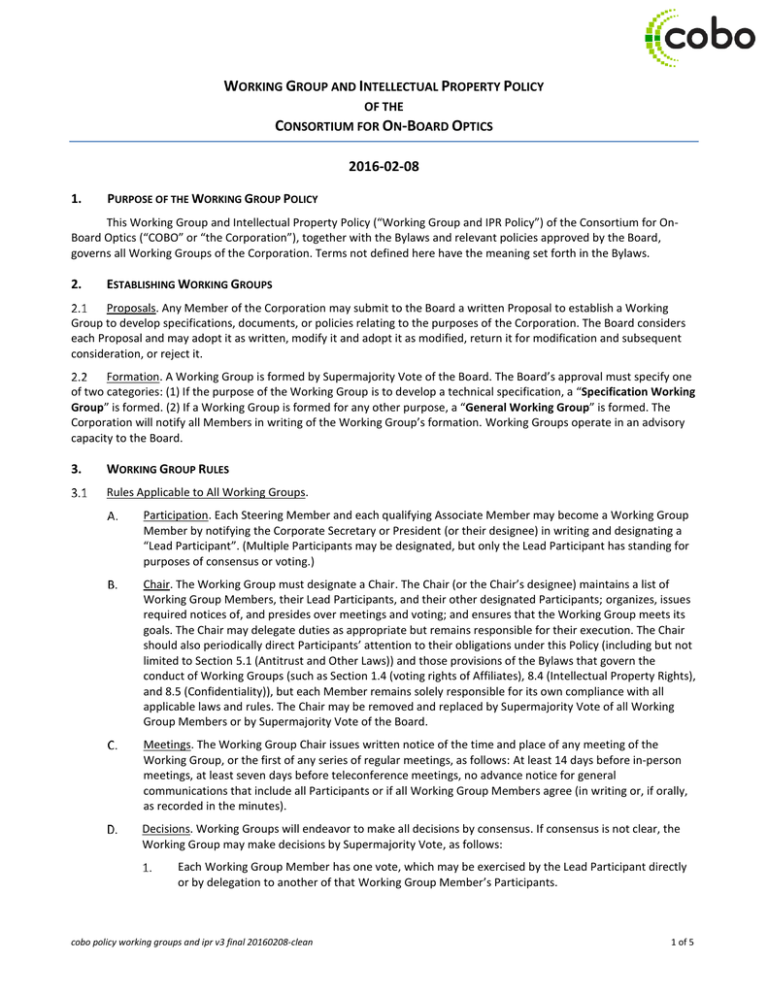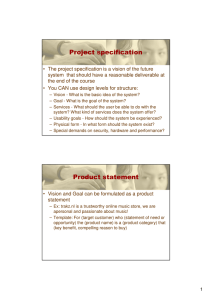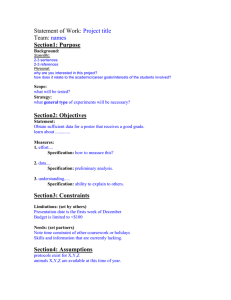
WORKING GROUP AND INTELLECTUAL PROPERTY POLICY
OF THE
CONSORTIUM FOR ON-BOARD OPTICS
2016-02-08
1.
PURPOSE OF THE WORKING GROUP POLICY
This Working Group and Intellectual Property Policy (“Working Group and IPR Policy”) of the Consortium for OnBoard Optics (“COBO” or “the Corporation”), together with the Bylaws and relevant policies approved by the Board,
governs all Working Groups of the Corporation. Terms not defined here have the meaning set forth in the Bylaws.
2.
ESTABLISHING WORKING GROUPS
Proposals. Any Member of the Corporation may submit to the Board a written Proposal to establish a Working
Group to develop specifications, documents, or policies relating to the purposes of the Corporation. The Board considers
each Proposal and may adopt it as written, modify it and adopt it as modified, return it for modification and subsequent
consideration, or reject it.
Formation. A Working Group is formed by Supermajority Vote of the Board. The Board’s approval must specify one
of two categories: (1) If the purpose of the Working Group is to develop a technical specification, a “Specification Working
Group” is formed. (2) If a Working Group is formed for any other purpose, a “General Working Group” is formed. The
Corporation will notify all Members in writing of the Working Group’s formation. Working Groups operate in an advisory
capacity to the Board.
3.
WORKING GROUP RULES
Rules Applicable to All Working Groups.
Participation. Each Steering Member and each qualifying Associate Member may become a Working Group
Member by notifying the Corporate Secretary or President (or their designee) in writing and designating a
“Lead Participant”. (Multiple Participants may be designated, but only the Lead Participant has standing for
purposes of consensus or voting.)
Chair. The Working Group must designate a Chair. The Chair (or the Chair’s designee) maintains a list of
Working Group Members, their Lead Participants, and their other designated Participants; organizes, issues
required notices of, and presides over meetings and voting; and ensures that the Working Group meets its
goals. The Chair may delegate duties as appropriate but remains responsible for their execution. The Chair
should also periodically direct Participants’ attention to their obligations under this Policy (including but not
limited to Section 5.1 (Antitrust and Other Laws)) and those provisions of the Bylaws that govern the
conduct of Working Groups (such as Section 1.4 (voting rights of Affiliates), 8.4 (Intellectual Property Rights),
and 8.5 (Confidentiality)), but each Member remains solely responsible for its own compliance with all
applicable laws and rules. The Chair may be removed and replaced by Supermajority Vote of all Working
Group Members or by Supermajority Vote of the Board.
Meetings. The Working Group Chair issues written notice of the time and place of any meeting of the
Working Group, or the first of any series of regular meetings, as follows: At least 14 days before in-person
meetings, at least seven days before teleconference meetings, no advance notice for general
communications that include all Participants or if all Working Group Members agree (in writing or, if orally,
as recorded in the minutes).
Decisions. Working Groups will endeavor to make all decisions by consensus. If consensus is not clear, the
Working Group may make decisions by Supermajority Vote, as follows:
Each Working Group Member has one vote, which may be exercised by the Lead Participant directly
or by delegation to another of that Working Group Member’s Participants.
cobo policy working groups and ipr v3 final 20160208-clean
1 of 5
Adoption of a Charter, Initial Draft, or Approval Draft, if not established by consensus, requires a
Supermajority Vote of all Working Group Members. For all other matters, if not established by
consensus, votes may be taken at any meeting at which at least 2/3 of all Lead Participants are
represented (directly or by delegation to a non-Lead Participant representing that Working Group
Member, but not by proxy), and decisions may be made by Supermajority Vote of the quorum for
that meeting.
Working Groups may vote electronically on any matter without a meeting provided that (1) a written
ballot with only “yes” or “no” options is provided to all Lead Participants and (2) the voting remains
open for at least seven days or until a Supermajority of all Working Group Members is established.
Adoption of Charter and Initial Draft. The Working Group must adopt the approved Proposal as its Charter
or adopt a more-detailed Charter consistent with the Proposal within 28 days after its formation, and must
approve an “Initial Draft” Document (for General Working Groups) or Specification (for Specification
Working Groups) within one year after its formation, unless the Board’s approving resolution sets forth
different deadlines. If the Working Group fails to meet either deadline it must be rechartered or disbanded
unless the Board expressly approves its continued existence and sets new deadlines.
Approval Draft. When the Chair determines that the Working Group’s objectives under its Charter have
been met, the Chair will circulate to Working Group Members a draft that, if approved by the Working
Group Members, will then be submitted to the Steering Members for consideration (“Approval Draft”).
Steering Member Review. Within 60 days after receipt of an Approval Draft the Steering Members will vote
on the Approval Draft. If approved by a Supermajority Vote of all Steering Members, the Approval Draft is
submitted to the Board; if not, the Working Group may subsequently submit a revised Approval Draft.
Board Review. Within 35 days after receipt of an Approval Draft the Board will vote to (a) approve the
Approval Draft as an Approved Specification; (b) request that the Working Group submit a revised Approval
Draft; (c) reject the Approval Draft and disband the Working Group; or (d) take such other actions as are in
the best interests of the Corporation. If approved by Supermajority Vote of the Board, the Approval Draft
becomes an Approved Document or Approved Specification, and the Working Group is disbanded unless the
charter is unchanged. The Board may, when chartering a Working Group, specify as its starting point an
Initial Draft, Exclusion Draft, Approval Draft, Approved Specification, or other document (identified by date
or version) that was produced by another Working Group.
Publication. Except as determined by Supermajority Vote of the Board, only Approved Documents and
Approved Specifications may be published outside of the Corporation.
Copyright.
Rights in Contributions. To make any Contribution to a Working Group, Members must (1) have
sufficient rights to make the Contribution under the terms of the Bylaws and this Working Group
Policy and (2) must disclose the identities of all copyright owners in the Contribution.
Contributions License Grant. For purposes of the development, publication, distribution, and
modification of each Working Group Document or Specification, each Member and its Participants is
deemed to have granted a perpetual, nonexclusive, irrevocable, royalty-free, paid up, worldwide
license to copy, modify, prepare derivative works, publicly display, publicly perform, and distribute its
Contributions in their original and modified forms, and to allow others to do the same, with no
accounting obligations.
Publications License for Documents and Draft Specifications. Subject to the restraints on publication
set forth in Section 3.1I, unless otherwise determined by Supermajority Vote of the Board all
Proposals, Charters, Draft Documents, Draft Specifications, and Approved Documents are subject to
the license terms as set forth in Section 3.1J.4 of this Working Group Policy.
Publications License for Approved Specifications. Unless otherwise determined by Supermajority
Vote of the Board:
Proposals, Charters, Draft Documents, and Draft Specifications are subject to the
Corporation’s copyright and any concurrent rights held under copyright by the contributors.
cobo policy working groups and ipr v3 final 20160208-clean
2 of 5
Approved Specifications published by COBO are subject to CC BY-ND 4.0.
Approved Specifications that are provided to a standards-development organization for
further development are subject to CC BY 4.0, with the Consortium for On-Board Optics or
“COBO” identified as the copyright owner.
Rules Applicable to Specification Working Groups Only.
Patent Licensing (RAND).
Licensing Commitment. Each Working Group Member agrees it will offer to all applicants a
nonexclusive, worldwide, non-sublicensable, perpetual patent license to its Essential Claims on fair,
reasonable, and non-discriminatory terms to make, have made, use, import, offer to sell, sell, and
distribute conformant implementations of any Approved Specification of that Working Group. A
Member’s obligation to offer licenses to Essential Claims is perpetual and includes Essential Claims
owned or controlled by its Affiliates. If a Member or an Affiliate grants an exclusive license to or
transfers an Essential Claim, the transferee and all successors must be subject to the same licensing
obligations as the Member became obligated to under this Policy (and in the event that a Member or
its successors fails to include appropriate requirements in such transfer documents, it is nonetheless
intended that each Member’s obligations shall run with title to the patent and be binding upon any
transferee). Any license to Essential Claims may be conditioned upon the licensee’s reciprocal grant
of Essential Claims as defined by this Policy.
Patent Exclusion. A “Patent Exclusion Period” is required as to each Draft Specification (1) upon initial
adoption as a Draft Specification by the Specification Working Group and (2) again (if modified after
the first Patent Exclusion Period) before it is proposed to be an Approved Specification. The Chair
initiates the Patent Exclusion Period by notifying all Working Group Members in writing, identifying
the Draft Specification by date or version number, and stating a closing date at least 28 days after the
initial notice date. A Working Group Member may exclude Essential Claims from its licensing
commitments by providing written notice of that intent to the Working Group Chair and the
Corporate Secretary (“Exclusion Notice”) no later than the closing date of the applicable Patent
Exclusion Period. (A party that joins a Working Group after the closing date of a Patent Exclusion
Period must deliver any Exclusion Notice upon joining.) The Exclusion Notice must provide the patent
registration or application number, identify which portions of the Draft Specification are affected,
and briefly summarize the patent claims. A Working Group Member who fails to exclude a patent
during a Patent Exclusion Period may not subsequently seek to exclude an Essential Claim from the
licensing obligations. For subsequent Patent Exclusion Periods the exclusion opportunity applies only
to material in the Draft Specification that was not present during a previous Patent Exclusion Period
during which the Working Group Member had an opportunity to exclude. The exclusion opportunity
is not available with respect to a Member’s own Contributions. The Working Group Chair will make
the declarations available to the Corporate Secretary or President, who will promptly make the
declarations to all Members. Declarations will be made available to the general public upon
publication of the Approved Specification.
Members Not In Working Group. Members that are not in a Working Group may, at their sole option,
voluntarily deliver to the Corporate Secretary an Exclusion Notice or their agreement to be bound by
a voluntary licensing commitment with respect to any Draft Specification, Approval Draft
specification, or Approved Specification.
Defensive Suspension of Licenses. If an implementer of an Approved Specification or any of its
Affiliates (“Implementer”) initiates or joins a legal action asserting that an Approved Specification
infringes Implementer’s patent rights in an Essential Claim (as defined by this Policy), all patent
licenses to Essential Claims in that Approved Specification that benefit Implementer pursuant to this
IPR Policy are suspended automatically as of the date and time such suit or action is filed. (This
provision does not apply to a counterclaim or countersuit filed defensively in response to a prior
patent infringement action by the licensor.)
Submission to Standards-Development Organization.
cobo policy working groups and ipr v3 final 20160208-clean
3 of 5
Approved Specifications may, by Supermajority Vote of the Board, be submitted for publication or
further development to a recognized standards-development organization (“SDO”).
Terms to Include In Published Specifications. Published Specifications must include the following terms:
Copyright
Copyright © [Date] COBO Group. All Rights Reserved. This publication is subject to the terms of [Insert
reference to CC BY-ND 4.0 or CC BY 4.0].
Limitations
THIS DOCUMENT IS PROVIDED “AS IS.” The publisher and contributors expressly disclaim any warranties
(express, implied, or otherwise), including but not limited to implied warranties of merchantability, noninfringement, fitness for a particular purpose, or title. The entire risk of using or implementing this
document is assumed by the user. IN NO EVENT IS THE PUBLISHER OR ANY CONTRIBUTOR LIABLE TO ANY
PARTY FOR DIRECT, INDIRECT, SPECIAL, INCIDENTAL, OR CONSEQUENTIAL DAMAGES OF ANY KIND
(INCLUDING LOST PROFITS) BASED ON ANY THEORY OF ACTION (INCLUDING NEGLIGENCE), EVEN IF THE
OTHER PARTY HAS BEEN ADVISED OF THE POSSIBILITY OF SUCH DAMAGE. This document may be subject to
third party rights.
4.
REFERENCES TO OTHERS
Use of Member Name. Approved Documents and Approved Specifications may include attribution to COBO and to
Members that participated in the Working Group. Members may not otherwise use the name of any other COBO member
in connection with any Proposal, Draft, Document, Specification, or related activity of the Corporation without express
authorization from the named party.
5.
APPLICABLE LAWS
Antitrust and Other Laws. Members and their representatives must not violate laws and regulations applicable to
their conduct under this Agreement, including but not limited to antitrust laws and regulations. By way of example only,
and not as a substitute for each Member’s reliance on its own legal counsel: Members may compete against one another;
each Member may conduct its business in whatever way it chooses; each may design, develop, manufacture, acquire, or
market competitive deliverables, products and services; no Member is obligated to announce or market any products or
services; and Members are not to discuss product pricing, methods or channels of product distribution, division of
markets, allocation of customers, or other topics inappropriate for discussion among competitors.
6.
WITHDRAWAL; TERMINATION
Automatic Termination. If four consecutive Working Group meetings are convened with no Participants designated
by a Working Group Member in attendance that Member is automatically removed from the Working Group, but may be
readmitted (1) at the Chair’s discretion (unless such readmission is opposed by a majority vote of the Working Group) or
(2) by majority vote of the Board.
Voluntary Withdrawal. Any Member may terminate its membership in a Working Group or in the Corporation by
delivering written notice to the Corporate Secretary or President and to the Chair of any Working Group in which it
participates.
Involuntary Termination. A Member that violates the substantive rules of a Working Group or the Corporation or
declares patent exclusions in a manner or to an extent deemed by the Board to be inconsistent with the goals of the
Corporation may, after the Member has been given a reasonable opportunity to address the Board, be removed by
Supermajority Vote of the Board. The Board’s determination in each case is final and non-appealable, and as a condition of
participation in the Corporation each Member agrees no claim of any kind may arise from such removal or termination.
Effect of Withdrawal or Termination. No new obligations are incurred after a Member’s withdrawal or termination
from a Working Group or the Corporation, but any continuing obligations set forth in the Bylaws, this Policy, and other
applicable documents do not terminate. With respect to Specification Working Groups, if a Member withdraws or is
terminated before the work becomes an Approved Specification, the Member’s obligation to license Essential Claims as to
the Approved Specification includes (1) Essential Claims in that Member’s Contributions and (2) claims the Member did
cobo policy working groups and ipr v3 final 20160208-clean
4 of 5
not exclude pursuant to a formal opportunity to exclude claims as to a Draft or Approved Specification. In addition,
Sections 3.1I, 3.1J, 3.2A, and Articles 4 and 5 of this Policy survive any termination or withdrawal.
7.
DEFINED TERMS
“Approved Document” means any document (excluding Specifications) approved by Supermajority Vote of the
Board as set forth in this Policy and the Bylaws.
“Approved Specification” means any Specification approved by Supermajority Vote of the Board as set forth in this
Policy and the Bylaws.
“CC BY 4.0” means the Creative Commons Attribution 4.0 International license,
http://creativecommons.org/licenses/by/4.0/legalcode.
“CC BY-ND 4.0” means the Creative Commons Attribution-NoDerivatives 4.0 International license,
http://creativecommons.org/licenses/by-nd/4.0/legalcode.
“Contribution” means any submission to a Working Group that is either (1) submitted in writing or (2) stated orally,
written into the minutes of a Working Group, and attributed to an individual. A submitter may correct or withdraw a
submission within 21 days after it was made by providing written notice to the Chair; in the case of oral submissions, the
21 days run from the date the Working Group minutes were delivered to the individual submitter or its Lead Participant.
“Essential Claim” means a claim in any patent or patent application in any jurisdiction that is infringed by
implementation of the Normative Elements of an Approved Specification, and for which there is no non-infringing
alternative (based on the state of the art at the time the Approved Specification is approved). “Normative Elements” are
only those elements set forth in the Approved Specification that must be implemented to conform to the Approved
Specification (including its optional components, and excluding all other elements such as explanatory materials, enabling
technologies (e.g., operating systems, semiconductor technologies, other technical specifications even if referenced in the
Approved Specification), and portions of any product or combination of products not required for conformance to the
Approved Specification.
“Participant” means each individual who participates in a Working Group on behalf of a Member.
“Working Group Member” means a Member that has joined a Working Group and has not withdrawn or been
removed (pursuant to Section 3.1A or otherwise).
“Proposal” means any proposal relating to the purpose of Corporation.
“Specification” means a Draft Specification or Approved Specification.
“Supermajority” means 2/3 of all eligible voters (unless the provision specifies “Supermajority of a quorum”, which
means 2/3 of those in the quorum for that meeting).
Adopted 2015-09-24 (v1)
Revised 2016-01-11 (v2)
Revised 2016-02-08 (v3)
cobo policy working groups and ipr v3 final 20160208-clean
5 of 5



